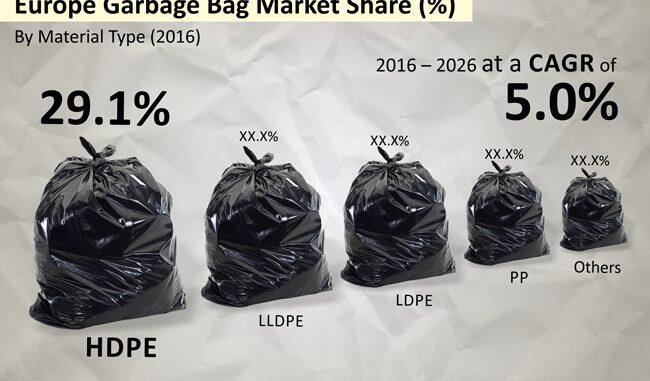Rising environmental concerns are driving demand for biodegradable and eco-friendly garbage bags. Hence, researchers around the world are finding the ways to turn plastic garbage bags into useful material. Companies are also introducing garbage bags that can be recycled and are eco-friendly. Manufacturers are using biomass materials to develop biodegradable plastic garbage bags. Premium garbage bags are also being introduced which are stretchable and can control odor, particularly in developed countries, where customers are willing to pay for these features. Garbage bag manufacturers are also focusing on introducing odor-cutting technologies.
According to the report by Future Market Insights (FMI), the High-Density Polyethylene (HDPE) garbage bagis anticipated to witness high growth rate in Europe. It is also expected to exceed 100 basis points by 2026. HDPE is expected to create incremental opportunity exceeding $300 million during 2016-2026. The waste management policy in Europe strives to enhance the use of oxo-degradable garbage bags, this is projected to drive the demand for HDPE garbage bags between 2016 and 2026.
However, the government in Europe is imposing a ban on plastic bags to reduce the impact on the environment, along with a complete ban on single use HDPE bags in Italy and France. This is hampering the growth of HDPE garbage bags.
Increasing demand for eco-friendly garbage bags
Governments across various countries are introducing extra charges for use of plastic garbage bags, this has resulted in the rising demand for biodegradable garbage bags. The Researchers at Iranian knowledge-based company have developed the biodegradable garbage bag using oxidized nanoparticles. This garbage bag is known as Oxazist. The nanoparticles used in garbage bags modify the mechanical properties. Moreover, the Iran Nanotechnology Initiative Council (INIC) has also confirmed the quality of these biodegradable garbage bags.
Polyethylene is used to make various products including grocery bags, garbage bags, machine parts, toys, etc. Hence, polyethylene ends up resulting in 60% of plastics in worldwide landfills. Researchers, however, have found a way to turn garbage bags into fuels. In order to break down a wide array of polyethylenes, researchers have repurposed a pair of existing catalysts, to convert these garbage bags into fuels and other useful chemicals. These catalysts are developed by Maurice Brookhart and his team from the University of North Carolina. The catalysts are used to link hydrocarbons known as alkanes. These short hydrocarbons are together linked into a longer hydrocarbon chain. Similar to the one found in diesel fuel.
Odor block technology is also being increasingly used by garbage bag manufacturers. The companies are researching and using various materials that can be used to develop garbage bags that absorbs odors.
According to the Plastic Division of the American Chemistry Council, the versatility of plastics and improved waste management can reduce its impact on the environment. Hence researchers are finding the ways to replace plastic with more eco-friendly material that can be recovered and recycled easily. Development of waste management infrastructures is also on the rise across various countries. These waste management facilities are using latest technologies to turn garbage bags and other plastic materials into fuels and various chemicals.
Source: http://bit.ly/2vKPBOn











